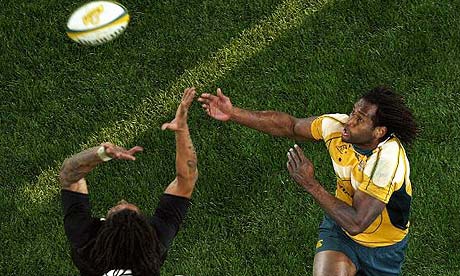
Distant third favourites behind the other two at the start of this Tri-Nations, Australia now sit handsomely at the top of the table, having played a game fewer than their supposed superiors. So much for received wisdom.
They moved top here in comfortably the best game of the tournament to date, what some will no doubt call a ringing vindication for the experimental law variations. With matters so sensitive in these days of argument and counter-argument there will also be plenty of cynics dismissing this as a game of no shape, but, whatever the laws played under, matches of this pace have to be welcomed and applauded.
Was it the new laws? Well, they probably helped – for the first time in this Tri-Nations there were a lot more free-kicks awarded than penalties (only six of the latter) and the vast majority of them were quickly taken, with impish quick-thinkers twisting exhausted defences this way and that. But this was far from the first match between these two played with bewildering pace and ambition, it won't be the last, and more importantly it struck a contrast with the less palatable affairs we have seen so far in this Tri-Nations. Games between Australia and New Zealand have always been easier on the eye than games featuring South Africa, whatever the laws.
The crucial moment of the match may well have been a crazy New Zealand substitution in the 49th minute. The All Blacks had just taken the lead for the first time with Dan Carter, magnificent again needless to say, having waltzed through the Australia defence. Andrew Ellis went over after the maestro had been hauled down a couple of metres out. Bearing in mind the pace of the game and the potential turning point this try might have represented, you don't then haul off your only openside, and you don't replace him with a big bull of a man with suspect handling skills.
Sione Lauaki was the man to replace Daniel Braid, who had ceded the upper hand to George Smith at the breakdown but was nonetheless doing good things as a link man in the All Blacks' many attacking raids. Lauaki, though, was a disaster. He managed to avoid dropping the ball at roughly the seventh attempt, by which time his fumbling at the base of the scrum and missed tackles had helped Australia to 17 unanswered points. And the game was theirs.
It was a well-deserved win and a triumph of rare satisfaction for Robbie Deans, the New Zealander now in charge of the Wallabies, who was passed over as All Blacks coach when the NZRFU chose to stick with Graham Henry after the World Cup. This will not have gone unnoticed in New Zealand.
Australia had racked up a 10-0 lead in a whirlwind first 10 minutes. Then it was over to the All Blacks, who enjoyed overwhelming amounts of possession, but, after a haka of rare fire and brimstone, the visitors were in a strangely casual mood.
Lote Tuqiri had punished Mils Muliaina's awful kick with a chip and chase that led to the opening try for Ryan Cross, but Muliaina made amends by finishing off a fine counterattack that ran most of the length of the field. The All Blacks, as ambitious as ever, were also making multiple handling errors and their defence was lazy, never more so than when Peter Hynes benefited from a Matt Giteau half-break and a clever chip by Adam Ashley-Cooper.
Andrew Hore kept New Zealand in it with a try before half-time for a 17-12 advantage to Australia at the break. Carter set up Ellis soon after and the game seemed there for New Zealand. Questionable leadership, both on and off the field, became all too apparent then, and it was Australia, themselves missing their usual captain, who stepped up. Rocky Elsom galloped over after another counterattack from deep, before Giteau's drop goal took Australia more than a score clear in the 67th minute.
Even then Australia looked the likelier to score. Sure enough, it was James Horwill who crashed over for the game's final try, and, sure enough, it was Lauaki he went through to score it. Richie McCaw, New Zealand's injured skipper and openside, should be back for next week's return in Auckland. Lauaki, though, probably won't.
Australia: tries Cross, Hynes, Elsom, Horwill cons Giteau 4 pen Giteau drop goal Giteau
New Zealand: tries Muliaina, Hore, Ellis cons Carter 2
Australia Ashley-Cooper; Hynes, Cross, Barnes, Tuqiri; Giteau (Tahu 77), Burgess; Robinson, Moore (Polota-Nau 59), Baxter, Horwill, Sharpe (Vickerman 62), Elsom (Waugh 59), Smith (capt), Palu
New Zealand Muliaina; Tuitavake, Kahui, Nonu (Smith 62), Sivivatu; Carter, Ellis (Cowan 46); Woodcock, Hore (Mealamu 49), Somerville (Afoa 62), Thorn, Williams, So'oialo (capt), Braid (Lauaki 49), Kaino
Referee C Joubert (South Africa)
Sydney 78,944
Game rating 8
Man of the match: Berrick Barnes. There were lots of much larger men running this way and that all around him, but Barnes's interventions were precise and thoughtful, and he was quite happy to flatten any of those bigger guys that came anywhere near him. Young Aussie midfielders seem to take to international rugby so much more easily than their English counterparts.

